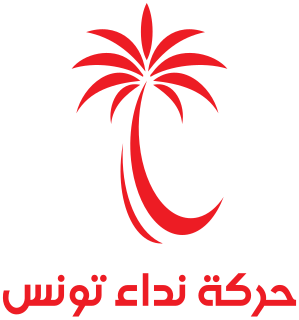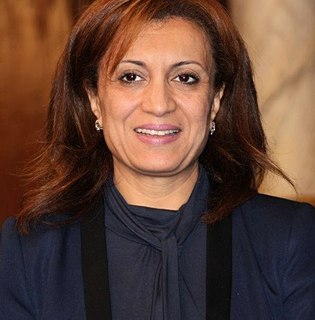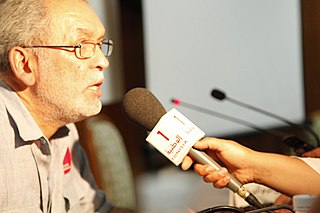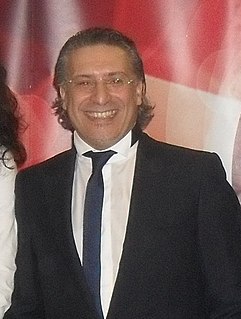
Tunisia, officially the Republic of Tunisia, is a country in the Maghreb region of North Africa. It is bordered by Algeria to the west and southwest, Libya to the southeast, and the Mediterranean Sea to the north and east; covering 163,610 km2 (63,170 sq mi), Tunisia is the smallest country in North Africa. It contains the eastern end of the Atlas Mountains and the northern reaches of the Sahara desert, with much of its remaining territory arable land. Its 1,300 km (810 mi) of coastline include the African conjunction of the western and eastern parts of the Mediterranean Basin. Tunisia's northernmost point, Cape Angela, is also the northernmost point of Africa. Its population was 11.7 million in 2019, and the capital and largest city is Tunis, located on the northeast coast, which lends the country its name.

Rached Ghannouchi, also spelled Rachid al-Ghannouchi or Rached el-Ghannouchi, is a Tunisian politician and thinker, co-founder of the Ennahdha Party and serving as its "intellectual leader". He was born Rashad Khriji.

Presidential elections were held in Tunisia on 23 November 2014, a month after parliamentary elections. They were the first free and fair presidential elections since the country gained independence in 1956, and the first direct presidential elections after the Tunisian Revolution of 2011 and the adoption of a new Constitution in January 2014.

The Democratic Forum for Labour and Liberties, also referred to as Ettakatol or by its French acronym FDTL, is a social democratic political party in Tunisia. It was founded on 9 April 1994 and officially recognized on 25 October 2002. Its founder and Secretary-General is the radiologist Mustapha Ben Jafar.

Mohamed Moncef Marzouki is a Tunisian politician who was President of Tunisia from 2011 to 2014. Through his career he has been a human rights activist, physician and politician. On 12 December 2011, he was elected as President of Tunisia by the Constituent Assembly.

The Ennahda Movement, also known as Renaissance Party or simply Ennahda, is a self-defined "Muslim democratic" political party in Tunisia. Founded as "The Movement of Islamic Tendency" in 1981, Ennahda was inspired by the Abul A'la Maududi, and Egyptian Muslim Brotherhood, it has also been called by Robert F. Worth "the mildest and most democratic Islamist party in history". Rached Ghannouchi is the movement's founder and has remained its president for 38 years without interruption.

Mohamed Beji Caid Essebsi was a Tunisian politician who was the President of Tunisia from 31 December 2014 until his death on 25 July 2019. Previously, he served as Minister of Foreign Affairs from 1981 to 1986 and as Prime Minister from February 2011 to December 2011.

Hamadi Jebali is a Tunisian engineer, Islamist politician and journalist who was Prime Minister of Tunisia from December 2011 to March 2013. He was the Secretary-General of the Ennahda Movement, a moderate Islamist party in Tunisia, until he left his party in December 2014 in the course of the 2014 Tunisian presidential election.

Nidaa Tounes is a big tent secularist political party in Tunisia. After being founded in 2012, the party won a plurality of seats in the October 2014 parliamentary election. The party's founding leader Beji Caid Essebsi was elected President of Tunisia in the 2014 presidential election.

Mohamed Brahmi was a Tunisian politician. Brahmi was the founder and former leader of the People's Movement, which, under his leadership, won two seats in the constituent election in 2011.

The People's Movement is a political party in Tunisia. It is a socialist, secularist and Arab nationalist party founded in April 2011. The composition of the party has changed several times as a result of mergers and splits. Between 2013 and 2014, the People's Movement was a member of the Popular Front coalition, one of the three main coalitions of political parties in Tunisia. The former leader of the party, Mohamed Brahmi, was assassinated on 25 July 2013 by unknown killers.

Parliamentary elections were held in Tunisia on 26 October 2014. Campaigning started on 4 October 2014. They were the first free regular legislative elections since independence in 1956, and the first elections held following the adoption of the new constitution in January 2014, which created a 217-seat Assembly of the Representatives of the People. According to preliminary results, Nidaa Tounes gained a plurality of votes, winning 85 seats in the 217-seat parliament, beating the Ennahda Movement and many smaller parties.

Othman Battikh is a Tunisian Islamic scholar, Grand Mufti of Tunisia, and former member of the Tunisian government.
Sonia Toumia is a Tunisian politician who was a member of the constituent assembly from 23 October 2011 until it was dissolved on 26 October 2014. The representative of the Islamist party Ennahdha for the Monastir riding, she was known for her humorous interventions during plenary sessions.

The Soliman Shooting is a violent incident which occurred on January 3, 2007 in the Tunisian region of Soliman, south-east of Tunis. The national police forces fought an armed group calling itself "Asad ibn al-Furat's army" which had been initially labeled by the government as "dangerous criminals". A previous shooting involving this same group had taken place on December 23, 2006 placing it in a context of jihadist terrorism and anarchist, insurgent, Islamist militancy.

Souad Abderrahim is a Tunisian politician. She was elected as the mayor of Tunis, Tunisia's capital, on July 3, 2018. She is a member of the Islamist Ennahda Movement, and the first woman to serve as Tunis's mayor.
Lotfi Bel Hadj is a French-Tunisian essayist, economist, and businessman. Born in Saint-Denis, he is the nephew of the former President of Tunisia Moncef Marzouki.

Kamel Jendoubi is a Tunisian politician and human rights activist.

Nabil Karoui is a Tunisian politician and businessman. One of the key figures in the Tunisian media landscape, Karoui is CEO of Karoui & Karoui World and owner of the Tunisian television station Nessma. Karoui ran as a candidate in the 2019 Tunisian presidential election, finishing in second place.
Abir Moussi, born on 15 March 1975 in Jemmal, is a Tunisian lawyer and politician. She has been the president of the Free Destourian Party since 2016 and a member of Parliament since 2019.















